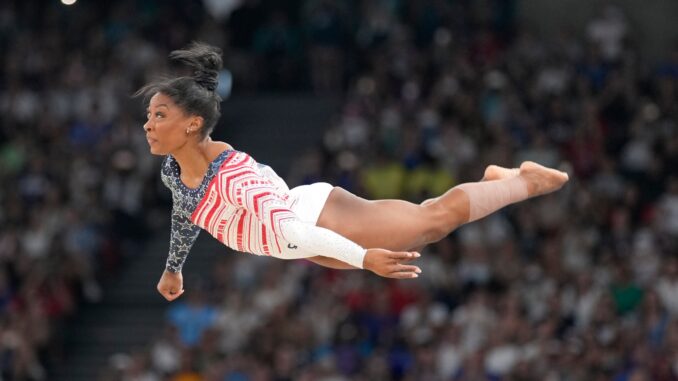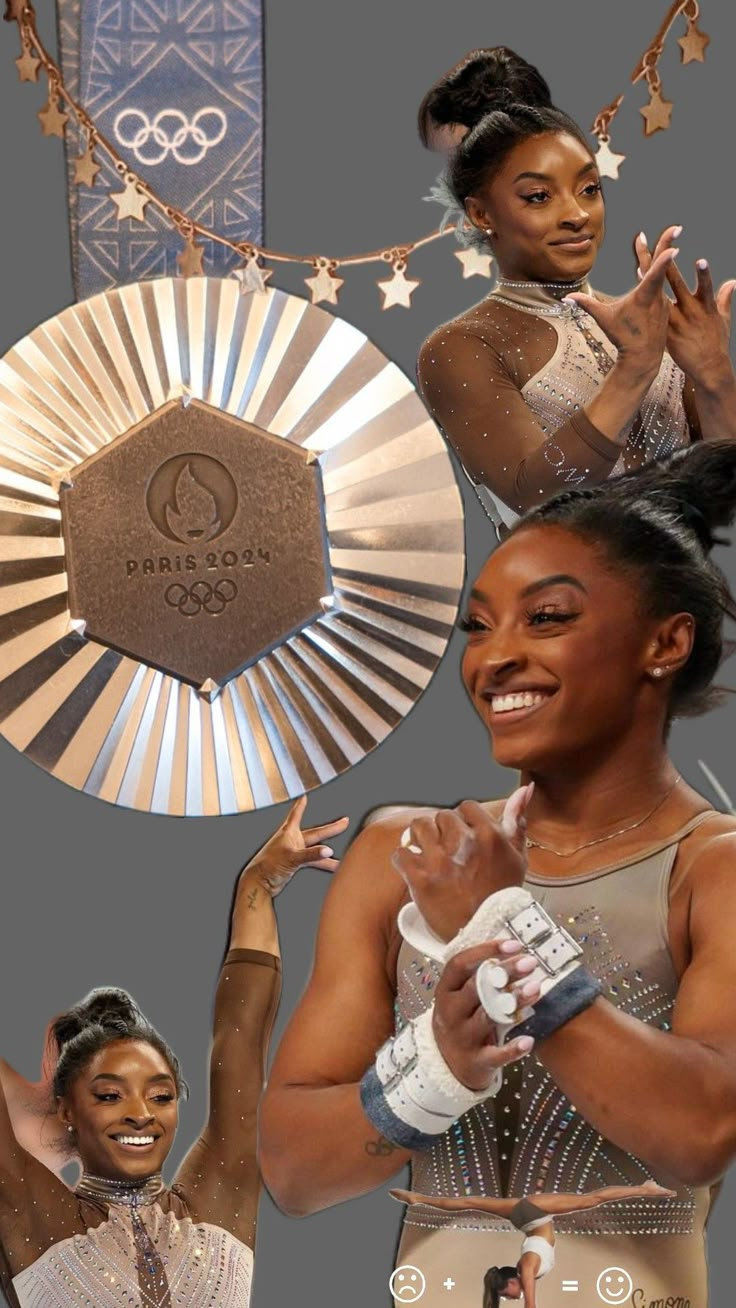
Olympic gymnast Simone Biles apologized to former collegiate swimmer and right-wing activist Riley Gaines on Tuesday for a personal comment she made as the two argued over a championship-winning high school softball player last weekend, though Biles maintained children “should never be the focus of criticism of a flawed system they have no control over.” Biles, who blasted Gaines for calling the trans softball player a boy and told her to “bully someone your own size, which would ironically be a male,” said in her apology “it didn’t help for me to get personal with Riley, which I apologize for.”
Biles said in her apology she was “not advocating for policies that compromise fairness in women’s sports” after telling Gaines on Saturday she should be “finding a way to make sports inclusive OR creating a new avenue where trans feel safe in sports.” “My objection is to be singling out children for public scrutiny in ways that feel personal and harmful,” Biles said. Gaines accepted Biles’ apology in a post Tuesday, saying Biles knows what being body-shamed feels like and that she is “still the greatest female gymnast of all time.” Gaines added sports are inclusive by nature but said competition is exclusive, “So the idea of ‘competitive equity’ is nonsensical.”
Gaines, who was a 12-time All-American swimmer for the University of Kentucky, became a right-wing activist following her tie with Thomas, which eventually led her to suing the NCAA over allegations it violated her civil rights by allowing Thomas to compete. The lawsuit has not yet been resolved. Gaines is one of the most vocal supporters of President Donald Trump’s agenda against transgender athletes. The president signed an executive order in February banning trans athletes from women’s sports at all levels and threatening to pull federal funding from schools allowing transgender athletes to participate in women’s categories. There are fewer than 10 transgender athletes within the NCAA’s roughly 530,000 student-athlete roster, according to Senate testimony given by NCAA president Charlie Baker last year.
In the world of sports, debates often transcend the playing field, sparking conversations that ripple through society. One such debate recently unfolded between Olympic gymnast Simone Biles and former swimmer Riley Gaines, centered around the inclusion of transgender athletes in women’s sports. What began as a public disagreement has now evolved into a moment of reflection and apology, highlighting the complexities of this ongoing issue.
The Catalyst: A Social Media Dispute
The controversy ignited when Riley Gaines criticized a Minnesota high school softball team that included a transgender player. She labeled the transgender athlete as a “boy,” a comment that drew sharp reactions from various quarters. Simone Biles, known for her advocacy of inclusivity in sports, responded on social media, labeling Gaines a “sore loser” and accusing her of bullying the young athlete. This exchange quickly escalated, drawing attention from supporters and critics alike.
Simone Biles’ Apology: A Step Toward Understanding
Recognizing the need for a more thoughtful approach, Simone Biles issued a public apology to Riley Gaines. In her statement, Biles acknowledged that her initial response had been personal and emphasized the importance of both competitive fairness and inclusivity in sports. She clarified that her intention was never to undermine the debate but to defend athletes from harmful scrutiny, especially minors. Biles called for sports organizations to develop inclusive yet fair policies, urging that individual athletes should not bear the brunt of criticism aimed at systemic issues.
Riley Gaines’ Reaction: From Criticism to Acceptance
Initially, Riley Gaines expressed disappointment over Biles’ comments, accusing her of tarnishing her legacy. However, after Biles’ apology, Gaines accepted the gesture, acknowledging Biles’ status as a legendary athlete. She emphasized the need for continued dialogue and mutual respect in addressing the complexities of transgender inclusion in sports. Gaines reiterated her stance on the importance of fairness and safety in women’s sports but expressed a willingness to engage in constructive conversations on the matter.
The Broader Debate: Transgender Athletes in Women’s Sports
This exchange between Biles and Gaines underscores a larger, ongoing debate: Should transgender athletes be allowed to compete in women’s sports? Proponents of inclusion argue that sports should be accessible to all, regardless of gender identity, and that policies should evolve to reflect this inclusivity. Conversely, critics like Gaines contend that allowing transgender women to compete in women’s categories may pose unfair advantages, citing physiological differences that could impact performance.
The Role of Sports Organizations: Crafting Fair Policies
In light of these debates, sports organizations face the challenge of developing policies that balance inclusivity with fairness. This includes considering factors such as hormone levels, transition timelines, and the potential advantages conferred by male puberty. The goal is to create an environment where all athletes can compete equitably, without compromising the integrity of women’s sports.
Public Figures and Their Influence on the Debate
Public figures like Simone Biles and Riley Gaines play a significant role in shaping public opinion on this issue. Their platforms allow them to influence discussions and bring attention to important aspects of the debate. While their views may differ, their willingness to engage in dialogue sets an example for others to follow, promoting a more nuanced understanding of the complexities involved.
The Importance of Empathy and Respect
One of the key takeaways from this incident is the importance of empathy and respect in discussions about sensitive topics. While it’s natural to have differing opinions, it’s crucial to approach these conversations with an open mind and a willingness to understand the perspectives of others. Personal attacks and inflammatory remarks only serve to deepen divisions and hinder productive dialogue.
Looking Ahead: A Path Toward Constructive Dialogue
As the debate over transgender athletes in women’s sports continues, it’s essential to foster an environment where respectful and informed discussions can take place. This involves listening to all sides, considering scientific research, and prioritizing the well-being of all athletes. By doing so, we can work toward solutions that uphold the values of fairness, inclusivity, and respect in sports.

Conclusion: A Moment of Reflection and Growth
The exchange between Simone Biles and Riley Gaines, though contentious, has provided an opportunity for reflection and growth. It serves as a reminder that even in moments of disagreement, there is potential for understanding and reconciliation. As we continue to navigate the complexities of transgender inclusion in sports, let this incident inspire more thoughtful and respectful conversations that prioritize the dignity and rights of all athletes.